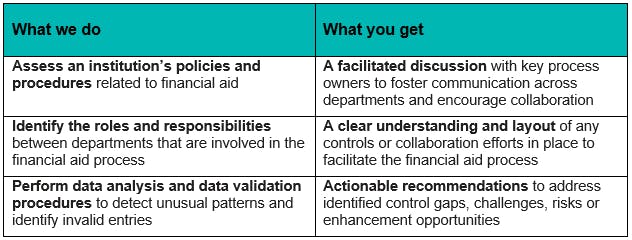
Faking it for the funds: financial aid fraud risk
As we embark on the new academic year, a growing concern that affects the higher education industry is financial aid fraud. In recent cases, institutions are investigating fictitious accounts enrolling in courses to obtain financial aid. It is critical to remain cautious and take proactive steps to prevent fraudulent activities that can negatively impact both students, who need financial aid support, and institutional reputation and resources.
Key considerations to protect your college or university
To help safeguard your institution against financial aid fraud, we urge you to consider the following verification procedures:
- Apply multi-factor authentication for access to institutional systems and forms (e.g., direct deposit applications)
- Train your employees on recognizing potential signs of fraud (e.g., suspicious payment requests, multiple applications from the same address, very similar applications from different students, etc.) and reporting procedures (e.g., anonymous reporting channels, chain of command, etc.)
- Perform data analysis to detect unusual patterns, such as high number of applications from the same IP address
- Compare enrollment or attendance records with financial aid information
- Implement data validation rules to identify invalid or unrealistic entries, such as birthdates that don't match the reported age on transcripts, duplicate banking account information or addresses that are non-existent
Baker Tilly can help
Our team of higher education risk specialists can help your institution proactively manage the high risks associated with financial aid fraud.
For more information, or to learn more about how Baker Tilly can help, contact our team.

